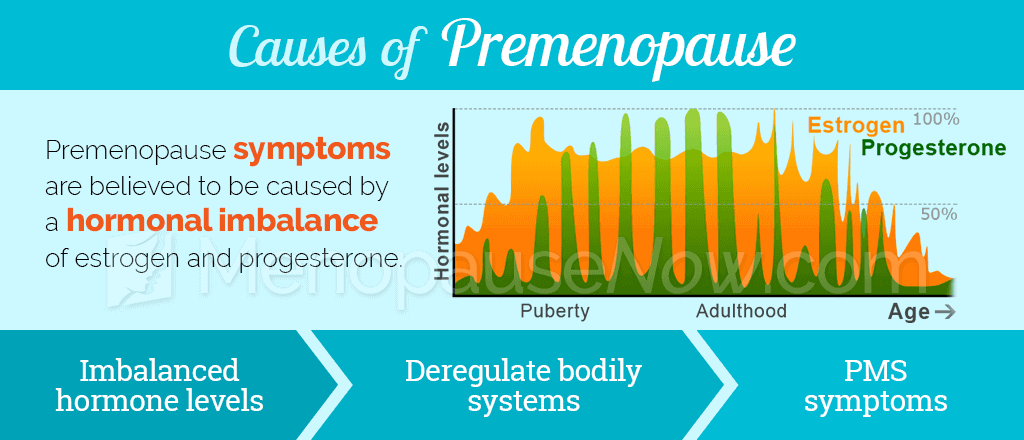As the beginning stage of the menopause process, premenopause represents the first time women will feel the influence of hormones in their bodies. During this time, three out of every four women report feeling bodily discomforts around their menstrual cycles, called premenstrual syndrome (PMS).1 Continue reading to learn about what causes PMS symptoms in premenopause.
Hormonal Causes of Premenopause Symptoms
The female reproductive system is guided by a regular fluctuation of hormones, namely estrogen and progesterone in tandem with others, to prepare the body for conception on a monthly basis. This process is known as the menstrual cycle.
While it is not well-defined which hormone causes PMS symptoms, it is believed that some women are more sensitive to the flux of estrogen and progesterone toward the end of the cycle. Moreover, changes in these ovarian hormones may influence neurotransmitters that play a crucial role in mood, such as serotonin.

Nevertheless, there are other causes of PMS symptoms that are not hormone-related. They are explained more in-depth in the following section.
Other Causes of Premenopause Symptoms
While hormone fluctuations play a main role in PMS, its symptoms can be brought on or intensified by the external factors, including, but not limited to:
Prolonged stress
According to the National Institutes of Health, women who reported feeling stressed around the time of ovulation - two weeks before menstruation - were up to four times more likely to report moderate to severe PMS symptoms in comparison to those women who were not.2
Poor diet
Having a poor diet lacking in essential vitamins and minerals while being high in refined carbs and sugars can worsen PMS symptoms. Moreover, excessive consumption of salt can promote bloating, fluid retention, and breast tenderness, and caffeine has been connected with premenstrual irritability and insomnia.3
Unhealthy habits
Studies have found that smoking increases the risk of moderate to severe PMS symptoms in young adulthood.4 Also, consuming alcohol escalates the risk of premenstrual syndrome to be 45 percent higher in drinkers versus non-drinkers.5
In sum, while it can be seen that hormones do lie at the root of PMS, aforementioned external factors can also be at fault for provoking bothersome effects in the body. Nevertheless, to continue moving forward on the path to hormonal well-being during one's peak fertile years, learn all about the possible premenopause symptoms that can occur by clicking on the preceding link.
Sources
- Mayo Clinic. (2018). Premenstrual syndrome (PMS): Symptoms & causes. Retrieved September 26, 2019, from https://www.mayoclinic.org/diseases-conditions/premenstrual-syndrome/symptoms-causes/syc-20376780
- MedlinePlus. (2019). Premenstrual Syndrome. Retrieved September 26, 2019, from https://medlineplus.gov/premenstrualsyndrome.html
Footnotes:
- Office on Women's Health. (2018). Premenstrual syndrome (PMS). Retrieved September 26, 2019, from https://www.womenshealth.gov/menstrual-cycle/premenstrual-syndrome
- National Institutes of Health. (2010). Prior stress could worsen premenstrual symptoms, NIH study finds. Retrieved September 26, 2019, from https://www.nih.gov/news-events/news-releases/prior-stress-could-worsen-premenstrual-symptoms-nih-study-finds
- Dickerson, L.M. et al. (2003). Premenstrual Syndrome. American Family Physician, 67(8), 1743-1752. Retrieved September 26, 2019, from https://www.aafp.org/afp/2003/0415/p1743.html
- Bertone-Johnson, E.R. et al. (2008). Cigarette Smoking and the Development of Premenstrual Syndrome. American Journal of Epidemiology, 168(8), 938-945. doi: 10.1093/aje/kwn194
- The MGH Center for Women's Mental Health. (2018). In Brief: What's the Connection Between Alcohol and Premenstrual Symptoms? Retrieved September 26, 2019, from https://womensmentalhealth.org/posts/alcohol-premenstrual-symptoms/
